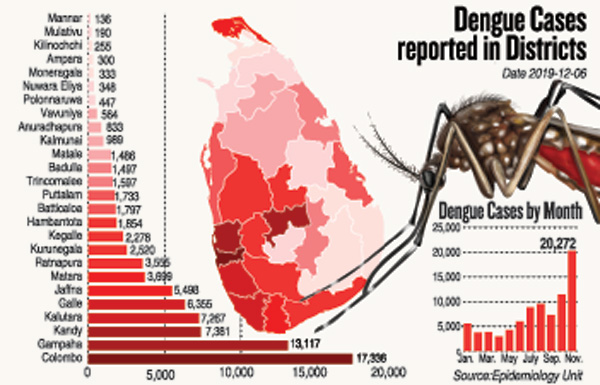News
Jaffna’s 500pc dengue increase sends control chief north
A fivefold increase in suspected dengue patients at a major Jaffna hospital and other disturbing news prompted an urgent visit to the north by the National Dengue Control Unit chief to assess the problem. 
Director Aruna Jayasekera visited the Jaffna Teaching Hospital to meet Jaffna Municipal Councillors, provincial health chiefs and other officials to discuss how best the outbreak could be controlled.
The intensified problem has prompted authorities to close down 60 tutoring establishments to help prevent the disease spreading. These tuition centres operate from 6 a.m. to 7.30 p.m. and accommodate 500-600 students at any one time.
Forty major and 20 smaller tuition establishments in the Jaffna municipal area are now closed until conditions improve.
Jaffna Teaching Hospital Director Dr. T. Sathyamoorthy reported a dramatic increase in patients with dengue symptoms.
Hospital figures showed 1,549 suspected cases were admitted to the hospital last month compared to only 261 in November 2018, a fivefold increase.
For all of 2018, the hospital saw 2,250 patients with the disease but that number has more than doubled this year, with a month still left to go. In Jaffna as a whole, 2,641 cases were reported last month, up from 525 the previous November.
The Jaffna Teaching Hospital has had to transform its surgical and medical wards to accommodate the influx of dengue patients. Currently, nine wards have been allocated for dengue patients, with each ward accommodating around 40 patients.
Dr. Sathyamoorthy accused local authorities of not taking appropriate measures early enough to stop dengue spreading.
Dengue cases have also risen sharply elsewhere in the north – in Mullaitivu, where seven cases were reported in November last year, as many as 50 patients were seen this November, with four people dying of the illness.
The Director of the Northern Provincial Department of Health, Dr. A, Ketheeswaran, said more than 110 suspected dengue patients were reported every day last week.
The numbers are slowing down, he said, with only around 40-50 cases this week. “This is because of the rains ceasing but the numbers can spike if the rain starts again,” he warned.
Dr. Ketheeswaran said while it was normal for the mosquito population to grow in November following the August and September rains, this year the rains had been erratic and incessant, causing a greater jump in numbers.
Poor solid waste collection and public refusal to co-operate in garbage segregation compounded the problem.
Dr. Ketheeswaran rejected claims that fogging should be carried out regularly to control the vector.
“We fog areas only if a patient [from that area] is diagnosed with the disease,” he said. On being notified of a case, the Health Ministry sends public health inspectors to inspect the area, carry out fogging and clean up the patient’s household and the neighbourhood in line with ministry policy to kill infected mosquitoes.
A Jaffna provincial councillor disclosed anonymously that of the 15 health ministry divisions in Jaffna the highest number of cases were in Kopay, Uduvil, Sandilippu, Chavakachcheri and Karaitivu.
Residents of those areas complained that the municipal council had not fumigated or sprayed larvicide around their homes and environment for more than 10 years.
The council said it had exhausted its stock of fogging chemicals and had asked for new stocks. The the National Dengue Control Unit said, that, due to shortages, it had been unable to supply Jaffna with spray. The next consignment is due in Colombo tomorrow (Monday).
Community Medicine Consultant Dr. Anoja Weerasinghe said the Dengue Control Unit focuses first on removing larvae. “If that is not possible, we spray larvicide. The aim is source reduction,” she said.
Jaffna residents have been asked to cover their water tanks and dispose of garbage responsibly. Authorities say many people do not bother to segregate their garbage and, when unsegregated garbage is not collected they either pay the collector privately to segregate the garbage or throw it on the roadside or into someone else’s garden.
National Dengue Control Unit chief Dr. Jayasekera said the problem existed everywhere, including Colombo. “Either they do not understand or don’t want to understand,” she said.
Across the island, 17,336 suspected dengue cases have been reported in the year to date, up more than 7,000 from last year, with 90 deaths.


